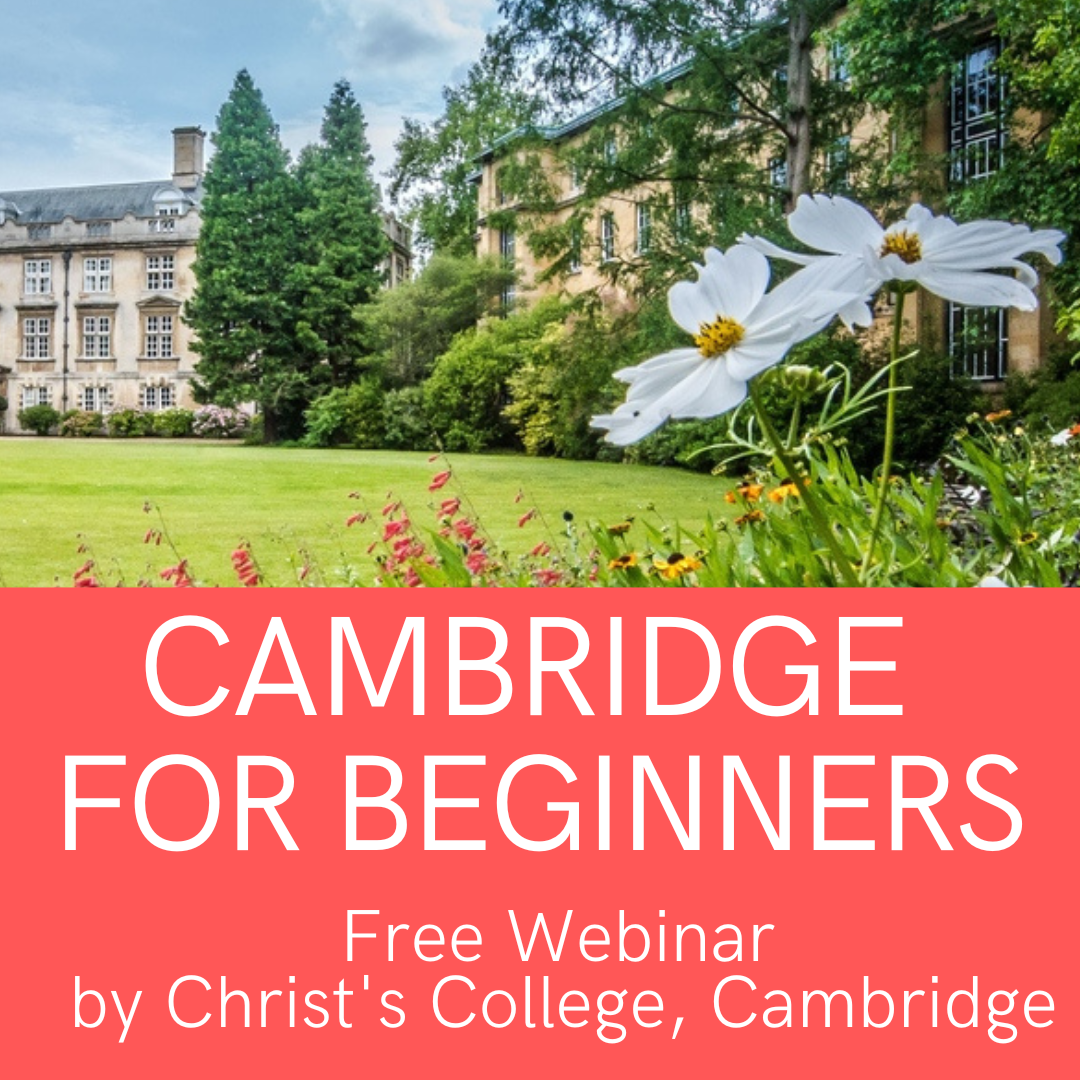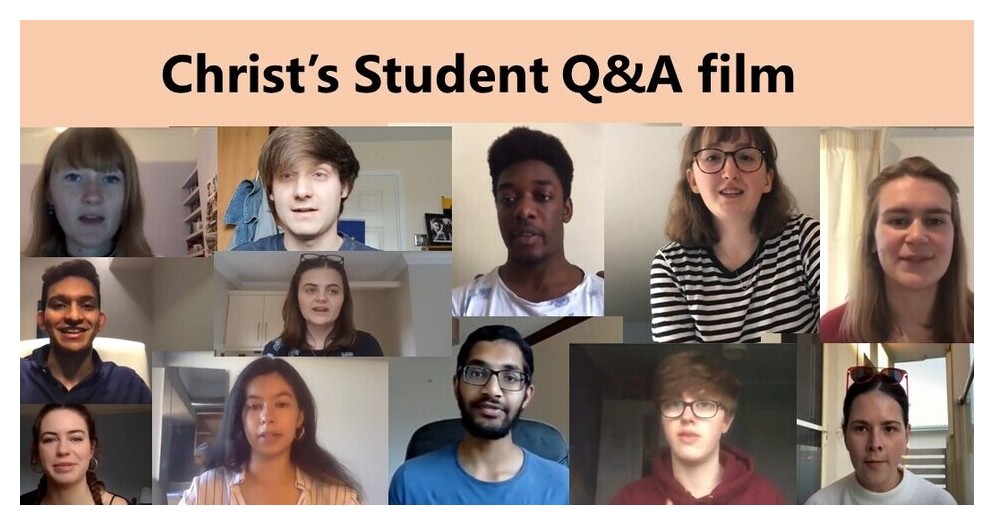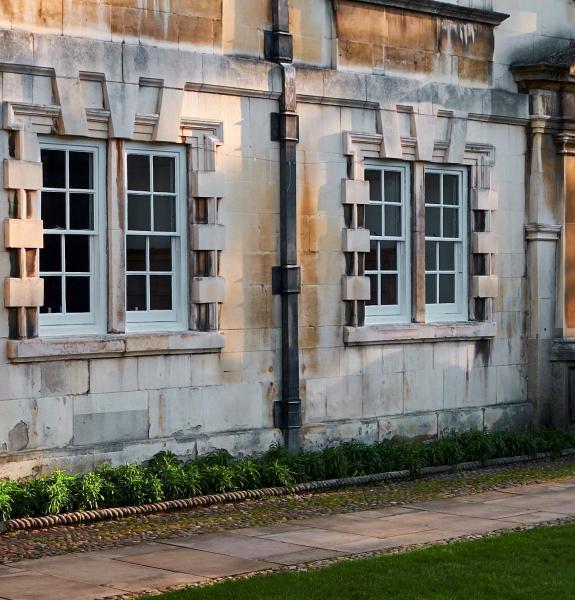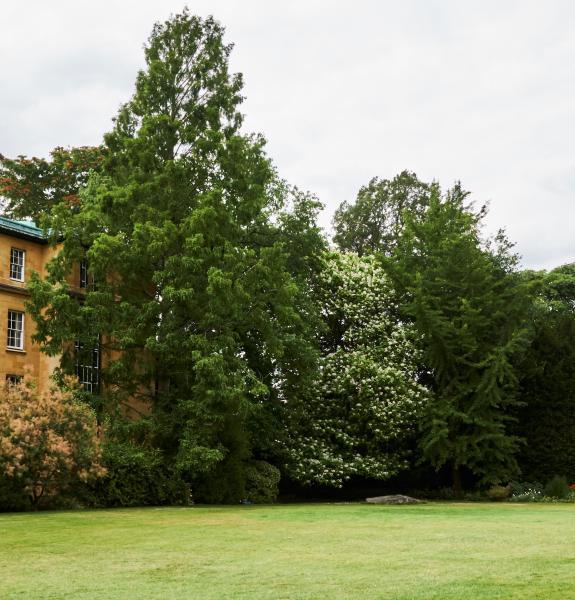
- Why Study Linguistics at Christ's?
- Course content and structure
- Teaching
- What do our students think?
- How to apply
- Helpful resources
- Open Days and Online Events
- Want to know more?
| Booking is open for our Linguistics subject meeting on Thursday 29 May |
Why Study Linguistics at Christ's?

Perhaps more than any other Cambridge college, Christ’s has been a hotbed of linguistic activity and boasts quite a number of alumni with linguistic interests:
- Charles Darwin, our most famous alumnus, engaged in a legendary debate with Max Müller over the evolution of language (see summary and the exchange of letters)
- Quentin Skinner, the prominent historian and former Fellow is known for (among other things) his work on speech act theory and rhetoric
- Richard Clarke, Laurence Chaderton and Francis Dillingham were among those commissioned by King James to translate the Bible into Modern English
- Sir Ernest Alfred Wallis Budge, notorious Egyptologist
- Sir John Lyons, author of a famous book on Noam Chomsky, and master of Trinity Hall
- Walter William Skeat, author of the landmark Etymological English Dictionary and the definitive edition of Chaucer’s works
- Sir Ralph Turner, leading Indologist, author of the great Comparative Dictionary of the Indo-Aryan Languages, and Director of the School of Oriental & African Studies (SOAS) at University of London
- Thomas Burrow, Boden Professor of Sanskrit at the University of Oxford and author of classic The Sanskrit Language
- Alfred Cort Haddon, one of the founders of modern British anthropology, famous for his study of life in the Torres Strait Islands
This course gives you broad interdisciplinary training, teaching you to analyse quantitative data, construct grammatical models and test hypotheses. As a result, you emerge with the kind of transferable intellectual skills employers are keen to see.
Graduates go on to careers in speech therapy, teaching (especially languages), speech and language technology and even forensic linguistics. Familiarity with the range of human languages is a huge advantage in careers where you might need to master a new tongue quickly, such as the Diplomatic Service.
Course content and structure
The Linguistics course (or ‘tripos’) is a three-year degree. Please visit the University website for full details of the Linguistics course content and structure, including the course film. You will also find information on the Department of Theoretical and Applied Linguistics page for prospective applicants. If you have further questions about course content, please email tal@mmll.cam.ac.uk.
Teaching
As well as lectures organised by the University’s Department of Theoretical and Applied Linguistics, you have a few 'supervisions' a week, either at the College, a different college, or one of the Department's rooms on the Sidgwick Site. These small-group tutorial sessions (1-to-1 or in pairs) give you personally-tailored tuition and support – one of the advantages of a Cambridge education. Christ’s Directors of Studies in Linguistics are Dr Matthew Tyler and Dr Li Nguyen. They arrange the supervisions for you and can offer guidance whenever you need it.
What do our students think?

Leah, Romany, Elliott, Imogen and Arthur studied Linguistics here at Christ's College. They have written about their experiences in their student profiles:
If you would like to hear more from Christ's students, please watch the Christ's student Q&A film, and visit our Student Profiles page.
How to apply
Visit How to Apply for full details and a timeline of the application process. We welcome applicants from all backgrounds and school types, all over the world. If you're applying from outside the UK, please read our international students section.
| News |
|---|
|
Subjects: what do you need?
As linguistics is interdisciplinary, we don’t need you to take specific subjects – we welcome applicants with an outstanding academic profile in the sciences or the arts. However, it is helpful to do some formal language study by learning languages or taking English Language A-level (or equivalent).
If you would like suggestions or to find out more about which subjects Linguistics students commonly take, please see the entry requirements tab in the undergraduate Linguistics course information.
We encourage students to attend one of our regular Subject Matters webinars for help with choosing Post-16 subjects for competitive university applications. This webinar is pitched for students aged 14-16 though it is also possible to attend when you have started sixth form.
What are we looking for?
We’re looking for applicants with a lively curiosity about the nature of language.
- Have you ever been struck by a language that puts verbs in a different position in the sentence?
- Or wondered why languages change over time – making Chaucer hard to understand, for instance?
- Or felt puzzled when speech recognition software gets a perfectly clear word wrong?
- Basically, if you’ve ever found yourself asking Why? or How? in relation to language, Linguistics is for you.
Interviews
If we select you for interviews, these usually take place in early December. At Christ's we do all of our interviews online. You can have your interviews either at home (most applicants do this) or at school (if easier).
Christ's interview candidates will have two interviews. There is no written assessment for Linguistics here at Christ's, but you will be given some comparable problems to prepare before one of your interviews starts, and you'll then work through the problems with the interviewer in the second half of the interview that follows (it will be an extended interview). Details will be given in your invitation to interview.
Further, more general information about interviews (including two useful films) is available in the Cambridge interviews section, and it's worth also having a look at supervisions (short film here), as interviews are similar to what you do every week as a Cambridge student.
Offers
We define the terms of each offer individually, but the typical conditional offer for Linguistics is:
- A*AA at A-level
- 42 points overall in the International Baccalaureate with 7,7,6 in relevant Higher Level subjects
- A1, A2, A2 in three Scottish Advanced Highers
You need to be academically ambitious: the majority of Christ's students arrive with higher grades than are required.
If you’re taking another qualification, we expect you to be working at or close to the top of the mark range i.e.
- Baccalauréat français international (BFI): 17 (mention très bien) out of 20 overall, with a minimum of 17 in individual subjects.
- European Baccalaureate: at least 85% overall, with 9/10 in relevant subjects
You can look up other qualifications in the offer levels for other exam systems and international entry requirements, and if you are applying from outside the UK please read the Christ's international students section for further information and check the country pages.
If you will have finished school when you apply, please also read about post-qualification applications, taking a gap year, and, if relevant, applying from a university.
Helpful resources
| Introductory reading suggestion | For students who are looking for an introduction to Linguistics, the Christ's Director of Studies particularly recommends Chapter 1 of Essentials of Linguistics (a FREE online textbook - just click on the link). We do need to emphasise that this is only a suggestion - it's not required reading for applicants to Christ's or anything like that (there's no disadvantage if you've been reading other things). Note also that we do not recommend that you read the rest of the textbook, just Chapter 1. |
| More reading suggestions | These are some further suggestions to help you find out more about Linguistics and develop your interests further. |
| Online lectures | Change and stability in the native language of migrants Stability and change in child language Language learning and creativity The acquisition and evolution of linguistic variation Darling, dukeling, duckling: how historical corpora can verify predicted pathways of language change |
| Podcasts | Because Language (all areas of linguistics) Lingthusiasm (all areas of linguistics) The Vocal Fries (specifically sociolinguistics) En Claire (specifically forensic linguistics) Spectacular Vernacular (all areas of linguistics) |
| Youtube | Youtuber Tom Scott has a series of videos called "Tom's Language Files" that give a basic overview of some topics within linguistics. K Klein has more detailed videos about lots of areas of linguistics Simon Roper talks a lot about historical linguistics, especially the history of English and Indo-European |
| Undergraduate Lingustics Association of Britain (ULAB) | ULAB's website contains a lot of information that might be helpful to prospective applicants. They have an online magazine (U-Lingua) with articles and puzzles written by undergraduates, as well as a journal that contains mostly undergraduate dissertations. |
| TED Talks | Who's an Eastender now? How language shapes the way we think Why language is humanity's greatest invention |
| British accents and dialects | Online resources from the British Library |
| Blog | The Language Log (also available as a Twitter feed). All things linguistic |
| Essay competitions | Entering an essay competition is a good way to explore a relevant topic and get some extra practice in writing a convincing and well-structured essay. Examples: Trinity Linguistics Prize; Babel Young Writers' Competition |
| National Linguistics Olympiads | These are competitions where you solve linguistics problems. See for example UK Olympiad (and their useful set of past problems). Other countries often have similar resources pages e.g. Australia, Ireland, USA to give a few examples from anglophone countries. Enjoy these but please don't worry if they seem difficult - they are designed to be challenging and are in general more involved than problems and puzzles that you would normally encounter in Cambridge interviews or the Linguistics written assessment. |
| The Linguist List | Website forum with discussion of linguistic issues. About the Linguist List |
| Linguistics-related free online courses | An Introduction to Sociolinguistics: Accents, Attitudes and Identity - University of York on FutureLearn Introduction to Comparative Indo-European Linguistics - Leiden University on FutureLearn Introduction to Intercultural Studies: Language and Culture - University of Leeds on FutureLearn |
| HE+ Linguistics | Website for secondary school students who would like to explore Linguistics |
| Language taster films | METIS presents a taste of Indoensian, Korean, Mandarin Chinese, Catalan, French, Arabic, Cornish, Portuguese, Persian, Nepali |
| CamGuides | Introducing the academic and information skills that you will need during your studies, as well as how and where you be working. |
Open Days and Online Events
Our open days and events page advertises regular online opportunities as well as events you can attend in Cambridge. If you can, sign up for a College Open Day (our October, February and September events normally include a meeting with a subject specialist). Between February and August we run regular webinars:
- Subject Matters: The importance of post-16 subject choices (this one is also run Sept - Nov)
- Cambridge for Beginners
- Personal Statements and preparing for an application
Further subject-specific opportunities you might wish to consider include Subject Masterclasses organised by Cambridge Admissions Office, and subject-specific talks in the July Cambridge Open Days. If you are a UK student from a background where there is little tradition of entry to Higher Education, you can apply to attend a Sutton Trust Summer School in Linguistics or to shadow a current undergraduate studying Linguistics via the Cambridge SU Shadowing Scheme (do be aware that there's a high proportion of applicants to places for both of these last two opportunities so please don't be discouraged if you don't get a place).
Want to know more?
For a fuller picture of what the course involves, read Undergraduate Linguistics admissions on the University website. You should also look at the information for prospective students on the Department of Theoretical and Applied Linguistics site.
If you can't find what you need, please send any queries to admissions@christs.cam.ac.uk. We'll be glad to help.
Back to the subject list / How to apply / Why choose Christ's?



